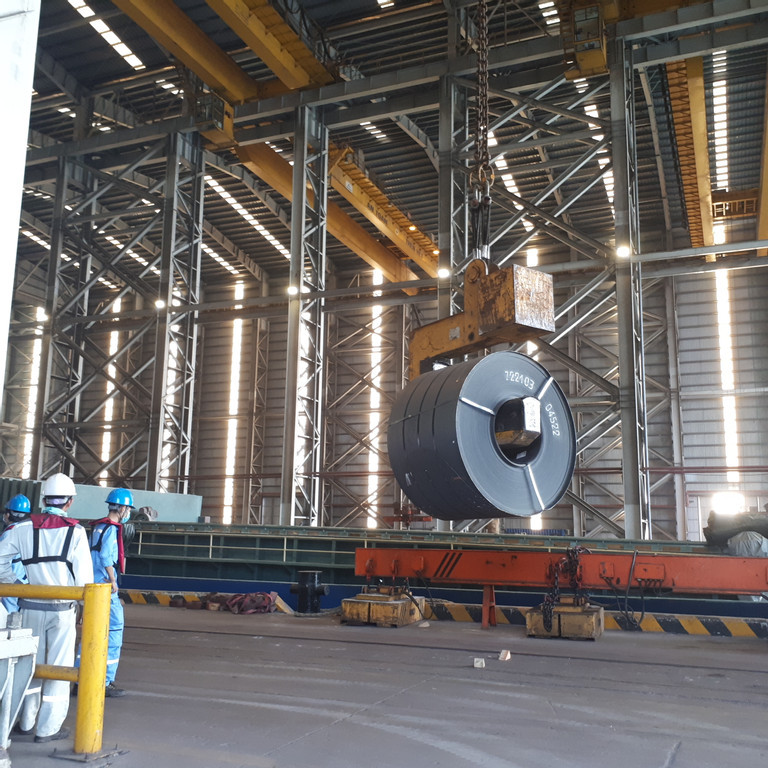
Vietnam’s exports to the EU now have to satisfy high requirements stipulated in EVFTA, as well as the CBAM, which took effect on October 1, 2023 and will be valid on a trial basis for three years.
CBAM will be valid for the transitional period with an aim to control the volume of carbon to be discharged to the environment during the production of all imports to the EU.
This is a policy tool of the EU which imposes a carbon tax on all the products to be imported to the EU, depending on greenhouse gas emissions during production in export countries.
The mechanism will initially be applied to imports with high pollution risks such as steel, cement, fertilizer, aluminum, electricity and hydrogen. These are industries which make up 94 percent of the emission volume of the EU. The mechanism will be implemented in three phases.
For most Vietnamese enterprises, CBAM is a new mechanism.
Le Anh, director of Le Gia Food Trade and Service, admitted that his knowledge about CBAM is still limited.
“Our vague understanding is that if manufacturers cannot show green certificates for their certain products, they will have to spend money to buy carbon certificates. The new mechanism will give advantages to the industries which have green certificates,” he said.
“We have just heard about carbon taxation. However, we understand that this is inevitable. As Vietnam has committed to reduce net emissions to zero percent by 2050, enterprises have to prepare and observe regulations,” he said.
According to the Vietnamese office of commercial affairs in Belgium, Luxembourg and the EU, though importers are required to collect the fourth quarter data since October 1, 2023, their first report will be submitted prior to January 31, 2024.
The gradual adoption of CBAM will help to implement the new regulation in a careful and predictable manner, suitable to both EU and non-EU businesses, as well as public authorities. In the immediate time, importers of new goods must report greenhouse gas (GHG) emissions of their imports (direct and indirect emissions) without making payments or financial adjustments.
Indirect emissions will be mentioned in the post-transition period for certain sectors (cement and fertilizers), with identification methodology.
After the mechanism officially become valid, slated for January 1, 2026, importers will have to make annual declarations about their import volume of the previous year and the GHG discharged to make these products. And they will pay the amounts for CBAM certificates proportional to imports.
The prices of the certificates will be defined based on the weekly average auction prices of EU ETS (Emissions Trading System) subsidies shown in euro/ton of CO2 emitted.
The gradual removal of the free distribution in accordance with EU ETS will take place at the same time with the gradual implementation of CBAM in 2026-2034.
Change or die
According to Nguyen Hong Loan from the technical assistance project on CBMA impacts, Vietnamese enterprises remain unfamiliar about reports related to GHG emissions. They need to calculate and find out the emission rates of products, not only products made in Vietnam, but also materials imported from other countries.
“This is really difficult work. If enterprises don’t make preparations in advance, they won’t be able to satisfy the EU’s requirements,” Loan warned.
She advised enterprises to set standards related to the environment, administration and social issues to heighten awareness and get ready as soon as the regulation is officially applied.
Nguyen Van Hoi, head of the Institute of Strategic Research and Industry and Trade Policy, commented that developed countries were applying increasingly strict requirements on products, especially on the environment, labor and production process. As Vietnam has been integrating into the world’s economy, it has to accept new regulations and observe them.
He said that CBAM suits Vietnam’s green growth strategy and commitment on emission reduction.
Ngo Chung Khanh from the Ministry of Industry and Trade said EVFTA emphasizes sustainable development, so Vietnam’s export companies need to pay attention to sustainable development, environmental protection and labor force.
Luong Bang